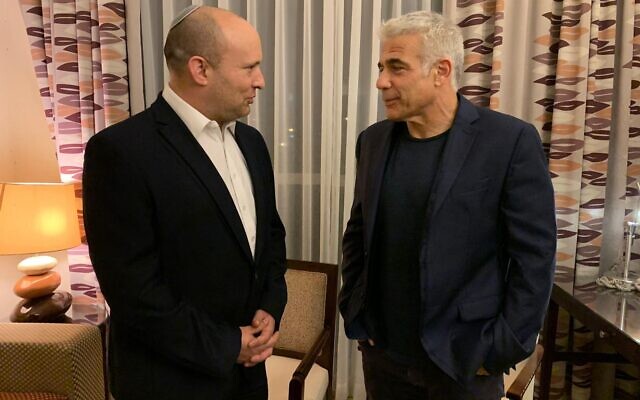Benjamin Netanyahu’s unprecedented 15-year reign as Israel’s longest-serving prime minister is ending.
On June 2, Netanyahu’s adversaries informed President Reuven Rivlin they had agreed to form a new coalition to supplant his right-wing government.
The two leading figures in the so-called “change bloc” are Yair Lapid, 57, the leader of the centrist Yesh Atid Party, and Naftali Bennett, 49, the head of the far-right-wing, pro-settlement Yamina Party, whose previous name was the New Right Party.
It’s an unlikely alliance. Bennett previously said he would prefer to sit in a right-wing government. He also vowed never to join forces with Lapid, his friend and rival.

Under their rotation agreement, Bennet would be prime minister for the first two years, the first Orthodox Jew and the second youngest person to hold that post. Lapid would be foreign minister during the interval. In 2023, they would switch roles, assuming their partnership is still intact.
Lapid’s marriage of convenience with Bennett was endorsed by Mansour Abbas, the leader of the United Arab List (Ra’am), an Islamist party Netanyahu had energetically attempted to coopt.
Counting Abbas’ four seats, the 57-strong Lapid camp can muster a razor-thin majority of 61 seats in the 120-seat Knesset if six out of seven members of the Yamina Party endorse the coalition. At the moment, one of its backbenchers, Amichai Chikli, refuses to support it, while another one, Nir Orbach, is wavering.

Lapid’s coalition is supported by eight of the 13 parties which won seats in the March 23 election. It is a rainbow coalition running the gamut from right to left, a potential government of ideological opposites. If confirmed by the Knesset next week, it would be one of the most politically diverse, yet fragile, governments in Israel’s history.
Apart from the Yamina Party, its components consist of Yesh Atid (17 seats), Benny Gantz’s centrist Blue and White Party (8), Avigdor Liberman’s right-wing Yisrael Beytenu Party (7), Meirav Michaeli’s center/left Labor Party (7), Gideon Sa’ar’s right-wing New Hope Party (6), and Nitzan Horowitz’s left-wing Meretz Party (6).
A month and a half ago, Miki Zohar, the Likud Party’s Knesset whip, said it would have no trouble leading the opposition if Netanyahu, its leader, fell short of forming a government. “We will go with our heads high,” he boasted.
But in the past two days, Netanyahu, a divisive figure and a wily political operator, has ferociously attacked Lapid and Bennett and tried to peel away defectors from Yamina in a bid to upend their plans to replace him.
On May 30, in a blatantly self-serving statement, he said, “This is an opportunistic government. A government of capitulation, a government of fraud, a government of inertia. A government like this must not be formed.”
And on June 3, he tweeted, “All Knesset members who were elected with the votes of the right must oppose this dangerous left-wing government.”
A left-wing government it will not be. To Netanyahu, virtually all his rivals are “left-wing.”
Now 71, Netanyahu is desperately clinging to power because he would be better positioned to defend himself against corruption charges of fraud, breach of trust and bribery while holding the prime ministership. He insists that he is innocent and that the case against him will crumble during his trial, which started in 2020 and is expected to last for at least another year.
The political drama currently unfolding in Israel deal comes at a particularly tumultuous moment.
Last month, Israel fought its fourth cross-border Gaza war with Hamas in 13 years. During the 11-day conflict, the most serious Jewish-Arab inter-communal unrest since the creation of Israel in 1948 rocked several Israeli cities.
After more than a year, Israel is finally emerging from the coronavirus pandemic, which has killed some 6,600 Israelis, caused tremendous damage to the economy, and brought into sharp relief the tensions between the secular Jewish majority and the ultra-Orthodox minority.
With Lapid, Bennett and Netanyahu jostling for power, two major appointments were announced. Isaac Herzog, the former leader of the Labor Party, will be Israel’s new president come July. And David Barnea has succeeded Yossi Cohen as the director of the Mossad, Israel’s external intelligence agency.
The diverse coalition that seeks to topple Netanyahu — a strident nationalist who paid only lip service to a two-state solution — is potentially fractious. In theory, Lapid supports Palestinian statehood, but Bennett staunchly opposes it and favors the annexation of about 60 percent of the West Bank.
Bennett, however, is something of a pragmatist. “This will not be the government of my dreams,” and it will depend on “numerous compromises and concessions of all the partners,” he wrote on his Facebook page recently. “Such a government will not be able to impose sovereignty on parts of the land of Israel, something I really believe in …”
Yet he and Lapid could make it work, at least for a while, if, as expected, they focus on rebuilding the economy after Covid-19 and refurbishing the country’s aging infrastructure.
Although the pair have little in common with respect to security issues, they’re united by an intense loathing for Netanyahu — who governed from 1996 to 1999 and again from 2009 to the present — and a burning desire to unseat him.
All the key principals of the Bennett-Lapid coalition have been Netanyahu’s allies at one time or another.
Lapid served as his finance minister. Bennett, his former chief of staff, was his minister of defence, education and Diaspora affairs. Liberman was Netanyahu’s minister of defence and foreign affairs. Sa’ar, who challenged Netanyahu for the Likud Party’s leadership in 2020, was minister of interior in one of Netanyahu’s governments. Gantz was minister of defence in Netanyahu’s last cabinet, and remains in that portfolio.
Gantz entered Netanyahu’s government in 2020, in the wake of Israel’s third election in two years. He joined on the understanding that he would take over as prime minister in the following autumn. But that deal collapsed when he and Netanyahu failed to agree on a state budget, necessitating a new election.
The March 23 election, the fourth since 2019, brought yet more paralysis. With Netanyahu’s Likud Party having won 30 seats, more than any other party, he tried but failed to cobble together a government. Gantz, Bennett, Sa’ar and Abbas rejected his overtures to prop up his government.

Lapid was on the verge of announcing the formation of a coalition when the war in the Gaza Strip broke out on May 10. In response, Abbas suspended talks with Lapid, while Bennett balked at joining a coalition dependent on Ra’am.
With negotiations stalled, pundits speculated that Netanyahu might outmaneuver Lapid and Bennett and somehow retain power.
This has proven to be illusionary so far.
Toward the end of May, Lapid and Bennett resumed their discussions. “This is the most complex decision I’ve made in my life, but I am at peace with it,” said Bennett, who sought to avoid a fifth election. As he put it, “Four elections … have already proven to all of us that there is simply no right-wing government headed by Netanyahu. It is either a fifth election or a unity government.”
Personal ambition, in reality, was doubtless one of the underlying motives for Bennett to align himself with Lapid rather than with Netanyahu. Bennett yearns to be prime minister, notwithstanding his party’s paltry seven seats, representing 6.2 percent of the electorate.
Lapid, with ten more seats than Bennett, should have had the first shot at being prime minister. But in an extraordinary and unique act of sacrifice, Lapid gave in to Bennett’s demand in the interests of sidelining Netanyahu.
Barring a disaster, Bennett is now about one week away from becoming prime minister. It would be an amazing comeback for a man whose party failed to cross the electoral threshold in the April 2019 election, but who now is poised to end the Netanyahu era in Israeli politics.
